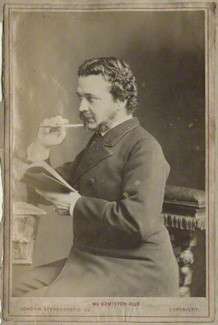Charles Hamilton Aide
Charles Hamilton Aide (sometimes written as Aidé or Aïdé; born in Paris, France, 1826 - died in London, England, 13 December 1906) was "for many years a conspicuous figure in London literary society, a writer of novels, songs and dramas of considerable merit and popularity, and a skillful amateur artist".[1] In particular, Aide was "known for such widely anthologized lyrics as 'Love, the Pilgrim', 'Lost and Found' and 'George Lee'".[2]

Biography
His father, an Armenian merchant, was killed in a duel when Aide was four years old. He was thereafter raised in England by his mother, who was the daughter of British Admiral George Collier. Aide attended the University of Bonn, then served in the British army seven years [3] until 1853, attaining the rank of captain.[4]
A lifelong bachelor, Aide lived in Lyndhurst with his mother.[4] After her death in 1875, he then "took rooms at Queen Anne's Gate where he hosted a celebrated salon which drew 'the chief figures in the social and artistic world of France as well as England'".[4] He was one of the male companions of Henry James, who characterised him as "the Diane de Poitiers of our time".[5]
He left his papers to Morton Fullerton.
Legacy
His entry in the Dictionary of National Biography sets forth that Aide was:
[A] man of versatile accomplishments and with abundant social gifts, who devoted himself with equal success to society, music, art, and literature.' He wrote several volumes of poetry, composed songs, exhibited the sketches made on his regular foreign travels at various galleries. He wrote nineteen novels dealing with fashionable society which 'enjoyed some vogue'. His drama Philip was produced with Irving in the lead at the Lyceum in 1874 and his comedy A Nine Day's Wonder was produced by John Hare and the Kendals at the Court Theatre in 1875.[6]
Aide left his papers to American author Morton Fullerton, then a correspondent for The Times in their Paris office, with open-ended instructions "to manipulate, to publish, or to burn as you think fit".[7] His estate was sworn at £43,000 gross.[8] His remaining literary copyrights were bequeathed to Lady Stanley.[9]
References
| Wikiquote has quotations related to: Charles Hamilton Aide |
- The Annual Register (1907), p. 147.
- Bertrand Russell, Kenneth Blackwell, Cambridge Essays, 1888-99: 1888-99 (1983), p. 383.
-

- Jeffrey Richards, Sir Henry Irving: A Victorian Actor and His World (2007), p. 167.
- Edel, Leon Henry James: The master, 1901-1916, p331
- The Dictionary of National Biography (1912), Vol. II, p. 2463.
- Marion Mainwaring, Mysteries of Paris: The Quest for Morton Fullerton (2001), p. 41.
- "The estate of the late Mr Charles Hamilton Aide of Ascot". Dundee Courier. 19 February 1907. Retrieved 21 August 2016 – via British Newspaper Archive.
- "Will of Mr. Hamilton Aide". The Daily News (UK). 19 February 1907. Retrieved 21 August 2016 – via British Newspaper Archive.
External links
- Works by or about Charles Hamilton Aide at Internet Archive
- Works by Charles Hamilton Aide at LibriVox (public domain audiobooks)
